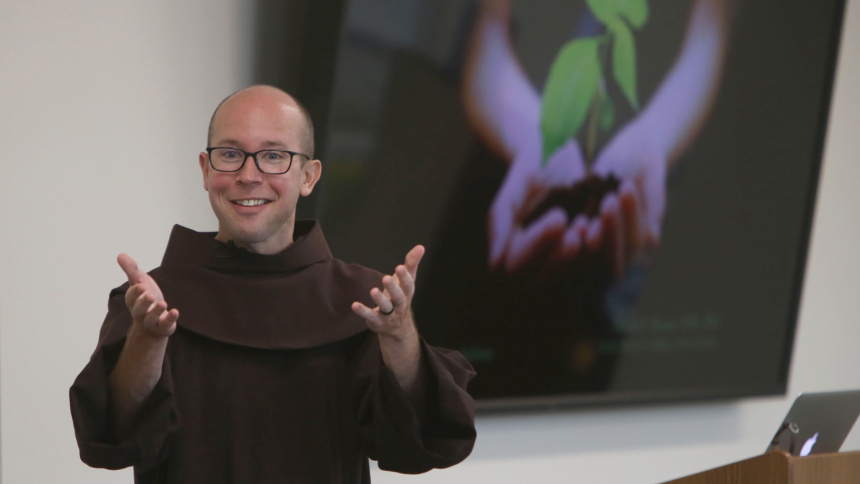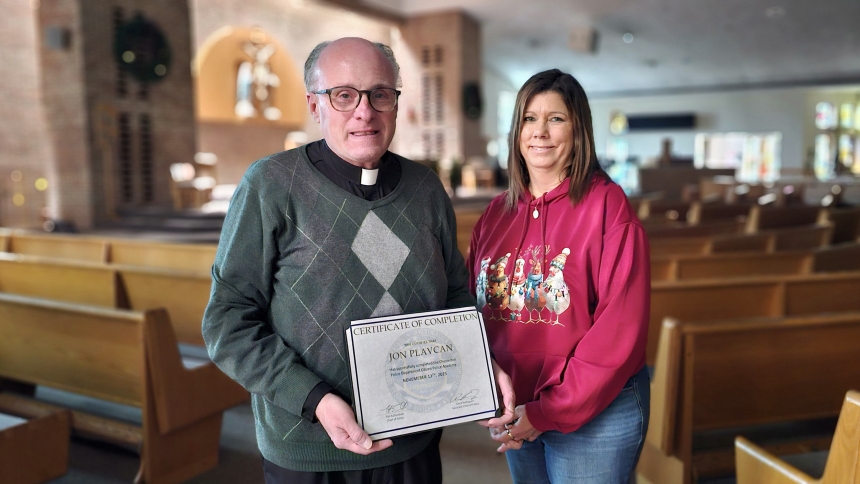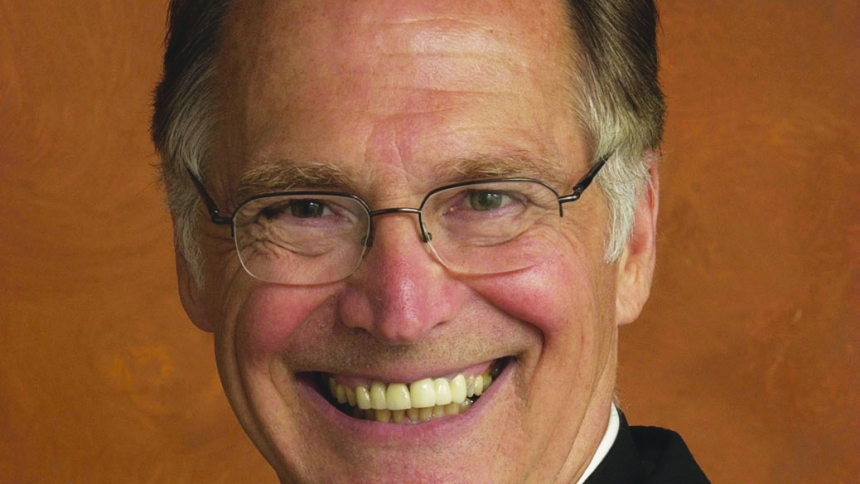
“St. Francis of Assisi reminds us that our common home is like a sister with whom we share our life and a beautiful mother who opens her arms to embrace us…This sister now cries out to us because of the harm we have inflicted on her by our irresponsible use and abuse of the goods with which God has endowed her.”
Pope Francis in “Laudato Si”
MICHIGAN CITY – “Caring for Our Common Home,” as outlined by Pope Francis in his 2015 encyclical “Laudato Si,” is “not optional, but a basic facet of justice,” Bishop Robert J. McClory told the congregation as he opened the “Summit on Laudato Si” hosted by Diocese of Gary’s Social Teaching Commission with morning Mass on Oct. 9 at Queen of All Saints.
In “Laudato Si,” the pope reminded Catholics that “the world is a gift we freely received (from God),” and should be lovingly cared for with an “intergenerational solidarity” that motivates all people to see environmentalism not as a new religion, “but a reflection of our faith,” according to the bishop.
“Let’s do our part to create a culture in which we care for all God has given us,” urged Bishop McClory.
Beth Casbon, moderator of the Social Teaching Commission, opened the day-long summit with the rallying cry, “We Are Called.”
Action must be taken now, she said, because, “The Lord calls us to that intergenerational solidarity so that we are able to pass on that glory (of this Earth) to future generations.”
Echoing that message was the keynote speaker, Father Daniel P. Horan, OFM, Ph.D., director of the Center for Spirituality at St. Mary’s College, Notre Dame.
“Pope Francis said that we need to see the simultaneous cry of the Earth and the cry of the people” - from forest fires in the U.S. and Australia, to a drought in India, to a tsunami in Japan – according to Father Horan. “We are interconnected, affected by each other. What happens in Japan affects us, (such as) the radiation from the power plant failure that reached the U.S.”
Father Horan noted that climate change “is not a theoretical problem, this is a life-and-death crisis today,” adding that Pope Francis also pointed out in “Laudato Si” that “it is the poor that suffer disproportionately from the effects of the environmental crisis.
After Father Horan’s lesson on the spirituality of the environmental imperative, “The Science Behind ‘Laudato Si’” was addressed by Julie Peller, Ph.D., a professor at Valparaiso University who has studied Lake Michigan extensively and also writes a column, “Green Junction,” on environmental issues for her church bulletin at Nativity of Our Savior in Portage. (To sign up for the column, email juluepel@gmail.com.)
Showing slides of majestic forests, beaches and plains, she pointed out, “This is the creation that is our gift, but we have to make sure we are taking care of it.”
Noting that scientific research is “methodical, detailed, slow, amazing and humbling,” Peller said, “This also explains my Christian faith journey. The more I learn, the more I realize how much I don’t know.”
Climate change, she added, “challenges us to face the consequences of our lifestyle, which has exploited nature” and created such massive waste “that it is harming other creation.” The way forward, said Peller, is through science and by adding climate change to everyday discussions. “Be attentive to information on the environmental degradation,” she urged, “and pick things to do, changes to make that invest in Mother Earth. Make sacrifices.
“We keep praying about it, but action has to happen,” she stressed. “The effects of climate disruption are fundamental ealth issues and pose an existential risk to all of us.”
“We must prioritize the care for creation now” and pursue solar energy options, buy electric cars and legislate to reduce the amount of plastics produced and discarded, Peller said.
The third speaker, Town of Highland Clerk-Treasurer Michael Griffin, concentrated on “The Public Policy Challenge of ‘Laudato Si’,” outlining the five stages needed to change public policy: problem definition, agenda setting, policy adoption, implementation and evaluation.
He used as an example an effort to reduce the amount of trash discarded by passersby, and discussed how to approach a legislative body with a proposed solution, secure a consensus to act and identify a funding source. Once more trash cans are distributed and someone agrees to service them, he added, supporters have to evaluate whether the solution is effective and make changes if necessary.
Griffin offered his audience an opportunity to participate in a brief exercise that identified an environmental policy problem and outlined the steps to address it, which led to a lively discussion.
“It is the duty in a democracy to listen to every viewpoint, but (leaders) have to make an informed decision for the good of all of our constituents,” he said.
The afternoon sessions of the summit offered three panel discussions focusing on what individuals can do in terms of spirituality and lifestyle to mitigate global climate change and better “care for our common home,” what society can do through advocacy and ministry, and how young adults fit into plans to shape their environmental destiny.
Joan Crist, Ph.D., a theology professor and environmental activist, does not use air conditioning, lives in a city (Hammond) where she walks and uses public transportation as much as possible, and curbs her consumerism. “Before I buy anything – anything – I ask myself three questions: Where did it come from? Where is it going to go when I throw it out? Do I REALLY need it?” she explained. “Almost always, after answering these questions, I don’t buy it.”
Sister Joyce Diltz, PHJC, a spiritual director, displayed a small detergent soap sheet that she now uses in her washing machine to eliminate the need for plastic detergent bottles.
Sister Michele Dvorak, PHJC, an educator and former Ancilla College president, said her religious community has installed solar panels at their motherhouse, and produces its own greens, vegetables and beef.
In terms of advocacy, Joe Shierling of the Archdiocese of Indianapolis described a Creation Care Commission that concentrates on education, awareness, spiritual focus and taking concrete action, such as lobbying the Indiana Legislature for a wetlands bill to protect the environment. “It’s been a challenge,” he admitted, but persistence is the key.
Alexander Mingus, assistant director of the Indiana Catholic Conference, said patience is needed to persuade legislators to act for the good of the Earth. “Cultivate a virtue of hope and pray for hope,” he said.
Robert Castagna, a lawyer who headed the Oregon Catholic Conference for 22 years, urged the laity to get informed and get involved in legislative action. “Sign up for legislative alerts when a bill is being considered, and communicate with your legislators,” he advised. “The time to act is now.”
A panel of young adults urged their more senior allies to take them and their ideas seriously. “Be accepting of young people (in your parish),” urged Carissa Corpuz of Holy Name of Jesus in Cedar Lake. “Reach out and have a conversation.”
Gina Vicari of St. Edward in Lowell suggested “listening and responding in a way that doesn’t dismiss the younger generation,” would go a long way toward collaboration on environmental causes.
“I strongly recommend your diocese adopt an action plan, a Catholic Climate Covenant,” said Castagna. “Get an energy audit for your parish, and the diocese” and develop an energy reduction plan. Parishioners, he added, need to support their leaders. “We need engagement.”


